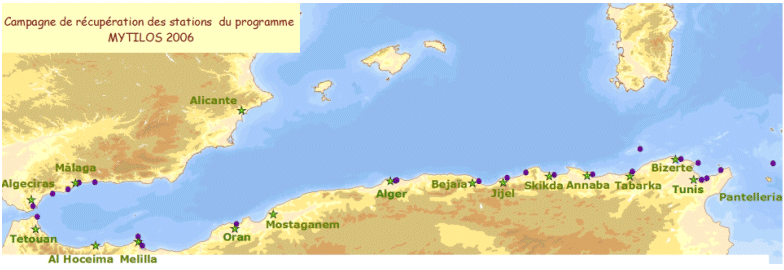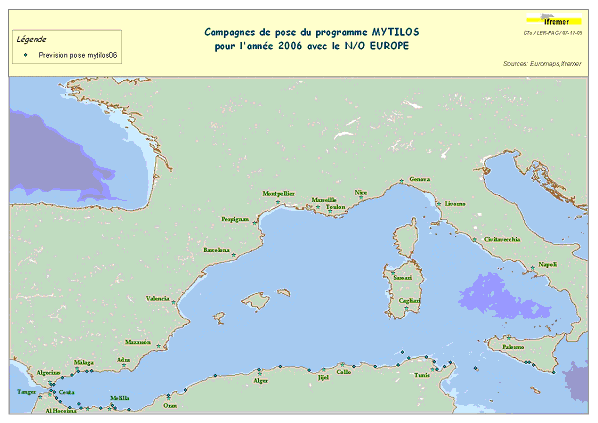Contact for the resource
Ifremer, Station de Corse
2 record(s)
Type of resources
Categories
Topics
INSPIRE themes
Keywords
Contact for the resource
Provided by
Years
Formats
Status
-

Assessment of chemical contamination in coastal water masses (Spain, Morocco, Tunisia, Sicily canal), using artificial stations of mussels. The MYTILOS1 cruise aimed to utilize the RINBIO network methodology around the western Mediterranean, in the northern part of the NW Basin. Experiments run in the French Mediterranean since 1996 by IFREMER were to be extended to Southern Mediterranean coasts, i.e. Spanish, Moroccan, Algerian and Tunisian coasts, as well as the Sicily Canal in Italy, on the basis of a standardized protocol. The data from MYTILOS2 cruise will supplement those obtained in 2004 and 2005 during the RINBIOC1 and MYTILOS1 cruises by including the coasts of North Africa, Southern Spain and the island of Pantelleria. In addition, the results will be used to complement the chemical contamination budget drawn up in the framework of the European Water Framework Directive's implementation. The survey was based on 2 major actions: 1) Artificial mussel stations were placed and recovered along a shoreline between Malaga (Spain) and Sicily (Italy), including Morocco, Algeria and Tunisia. 2) Sediment samples in addition to mussels samples were taken upon the partners' request. This falls under the MEDICIS project.
-

Assessment of chemical contamination in coastal water masses (Spain, Morocco, Tunisia, Sicily canal), using artificial stations of mussels. The MYTILOS1 cruise aimed to utilize the RINBIO network methodology around the western Mediterranean, in the northern part of the NW Basin. Experiments run in the French Mediterranean since 1996 by IFREMER were to be extended to Southern Mediterranean coasts, i.e. Spanish, Moroccan, Algerian and Tunisian coasts, as well as the Sicily Canal in Italy, on the basis of a standardized protocol. The data from MYTILOS2 cruise will supplement those obtained in 2004 and 2005 during the RINBIOC1 and MYTILOS1 cruises by including the coasts of North Africa, Southern Spain and the island of Pantelleria. In addition, the results will be used to complement the chemical contamination budget drawn up in the framework of the European Water Framework Directive's implementation. This falls under the 'MEDICIS' project.
 Catálogo de datos del IEO
Catálogo de datos del IEO